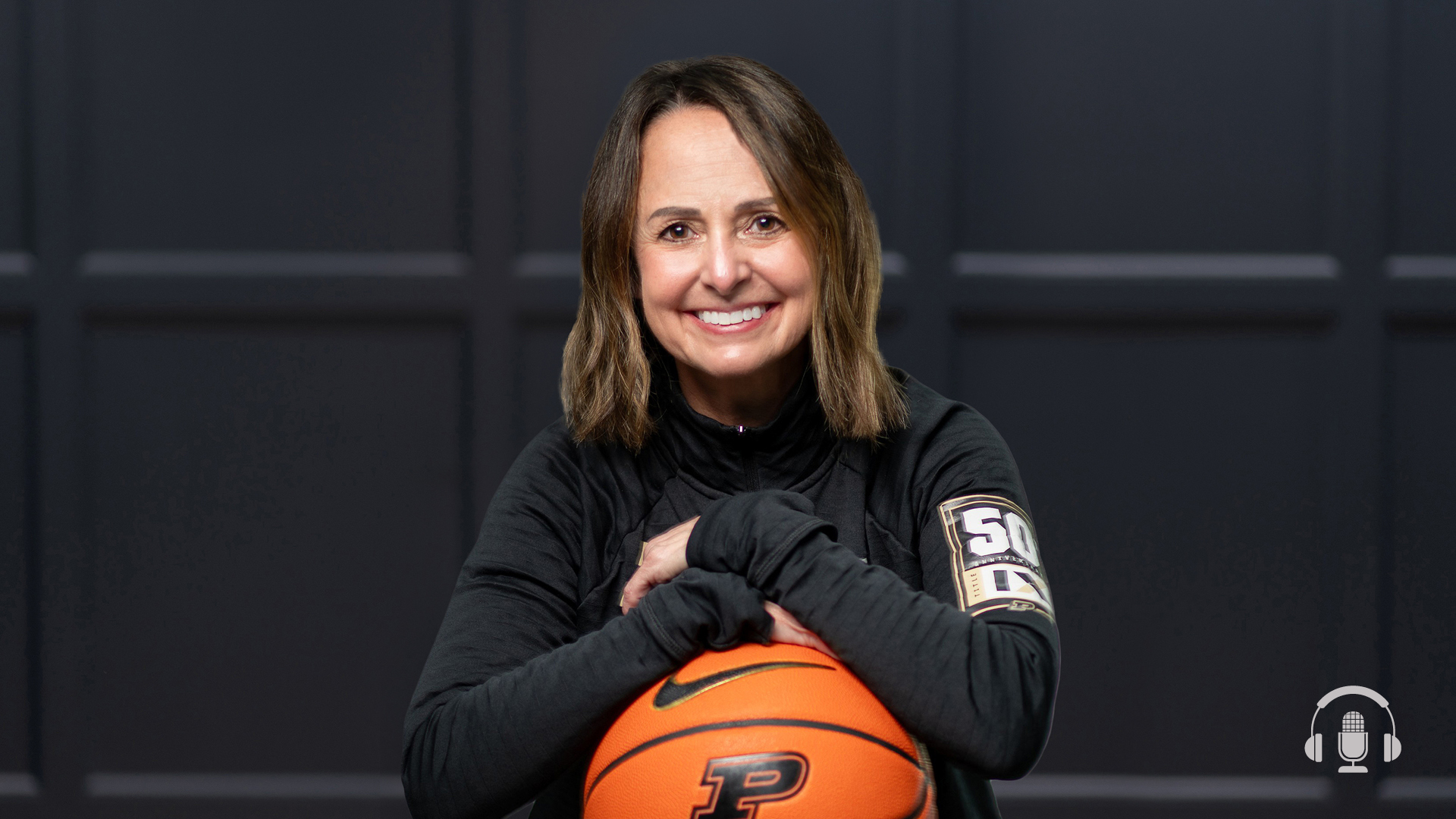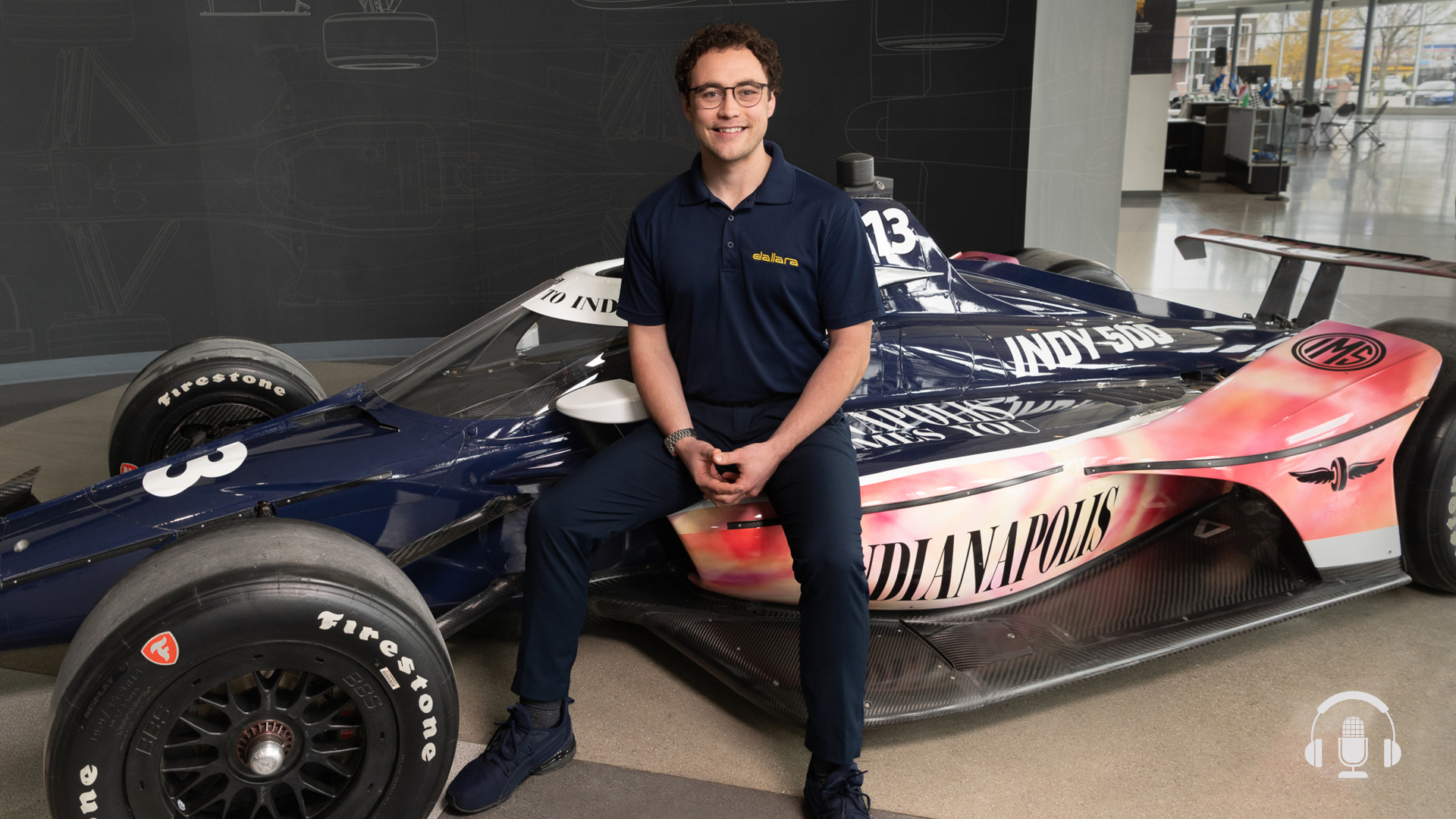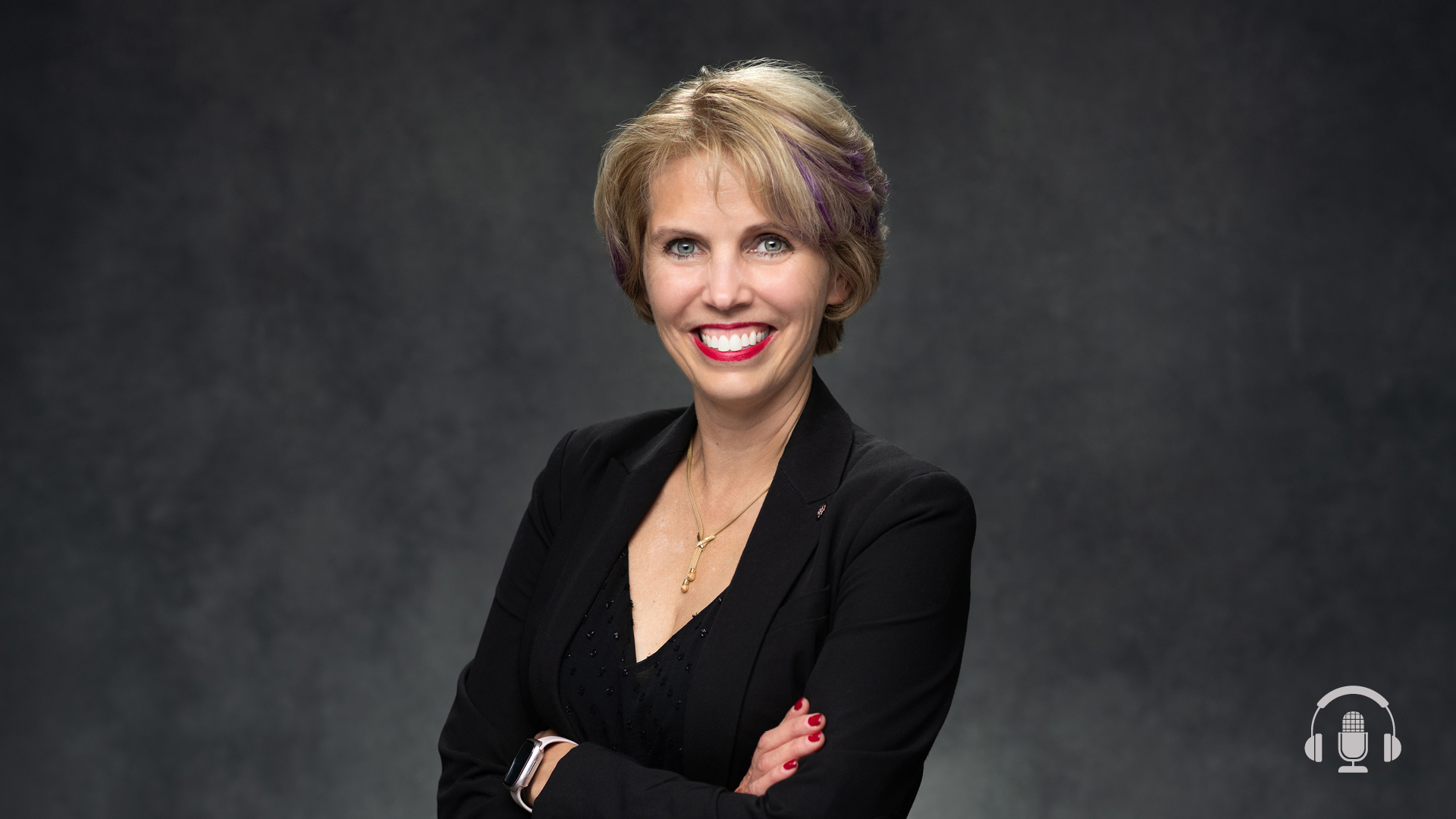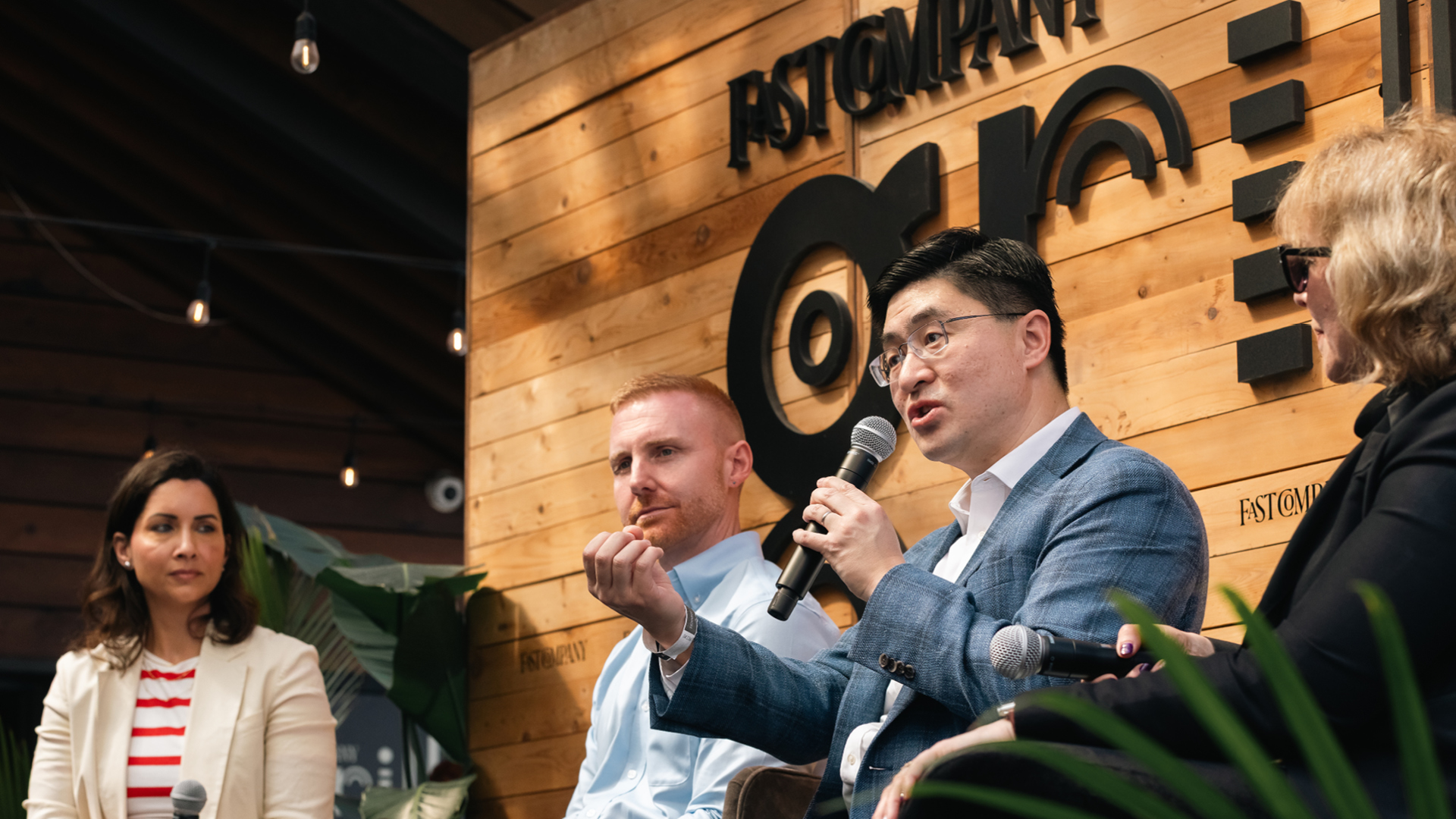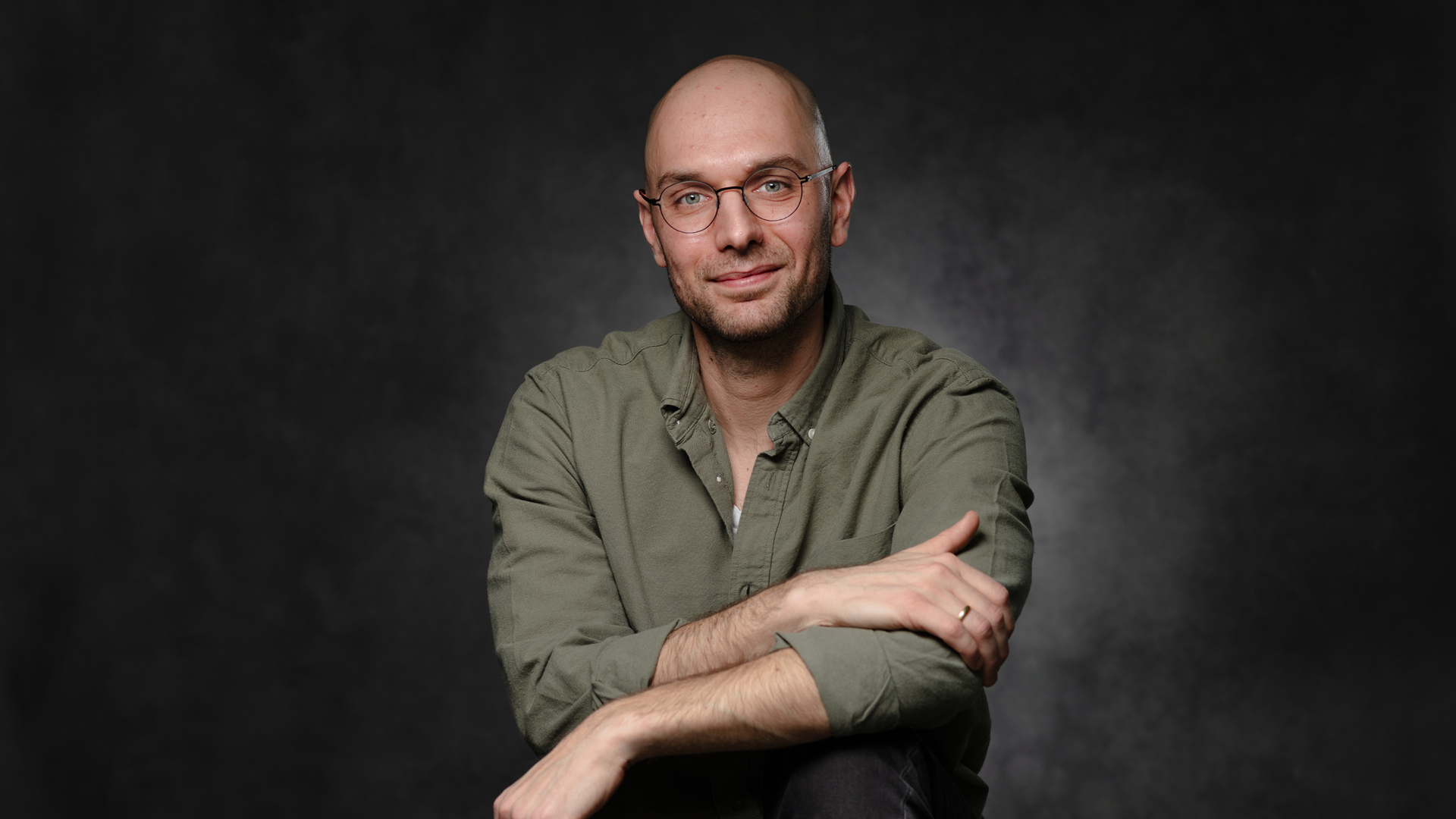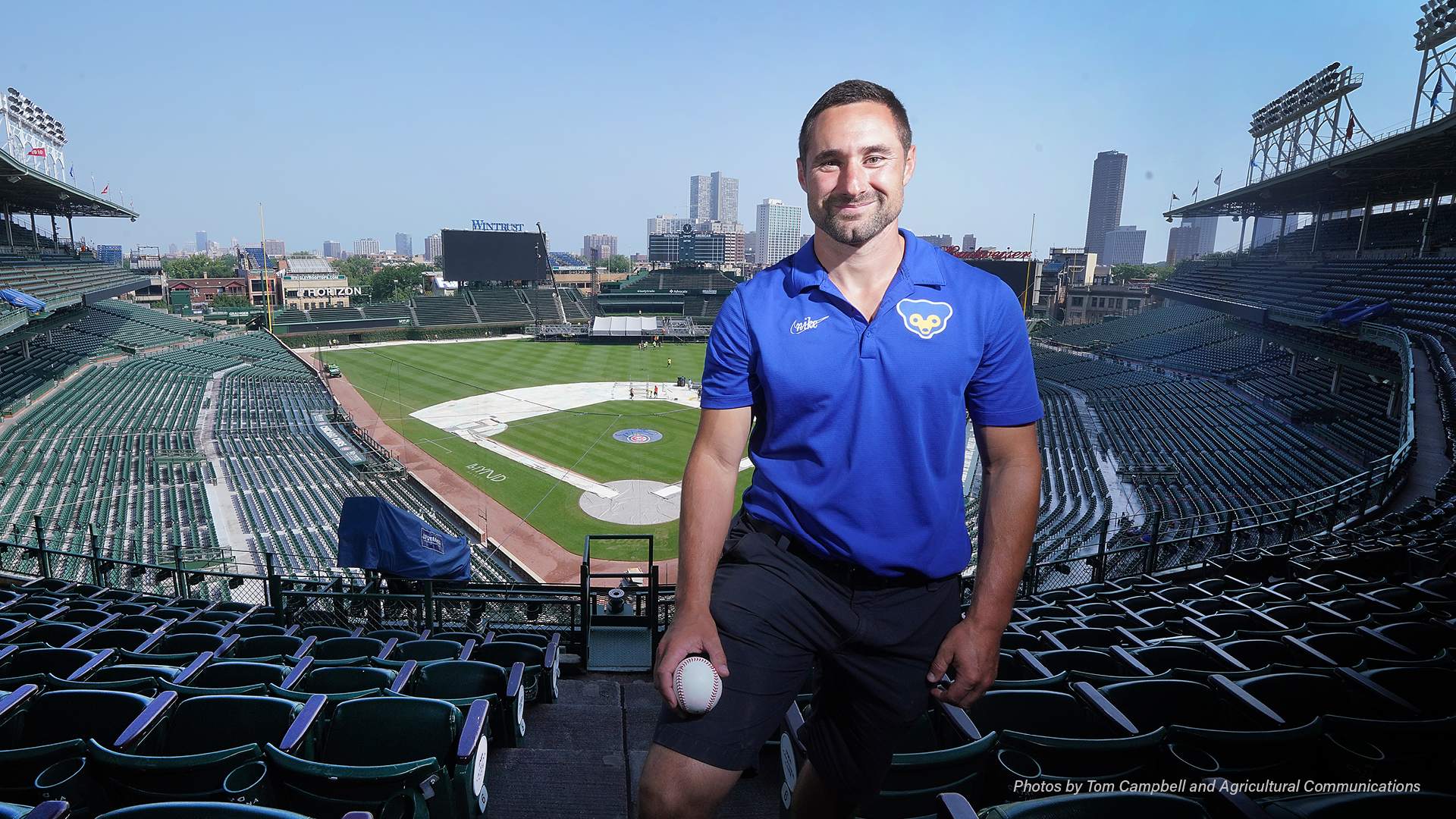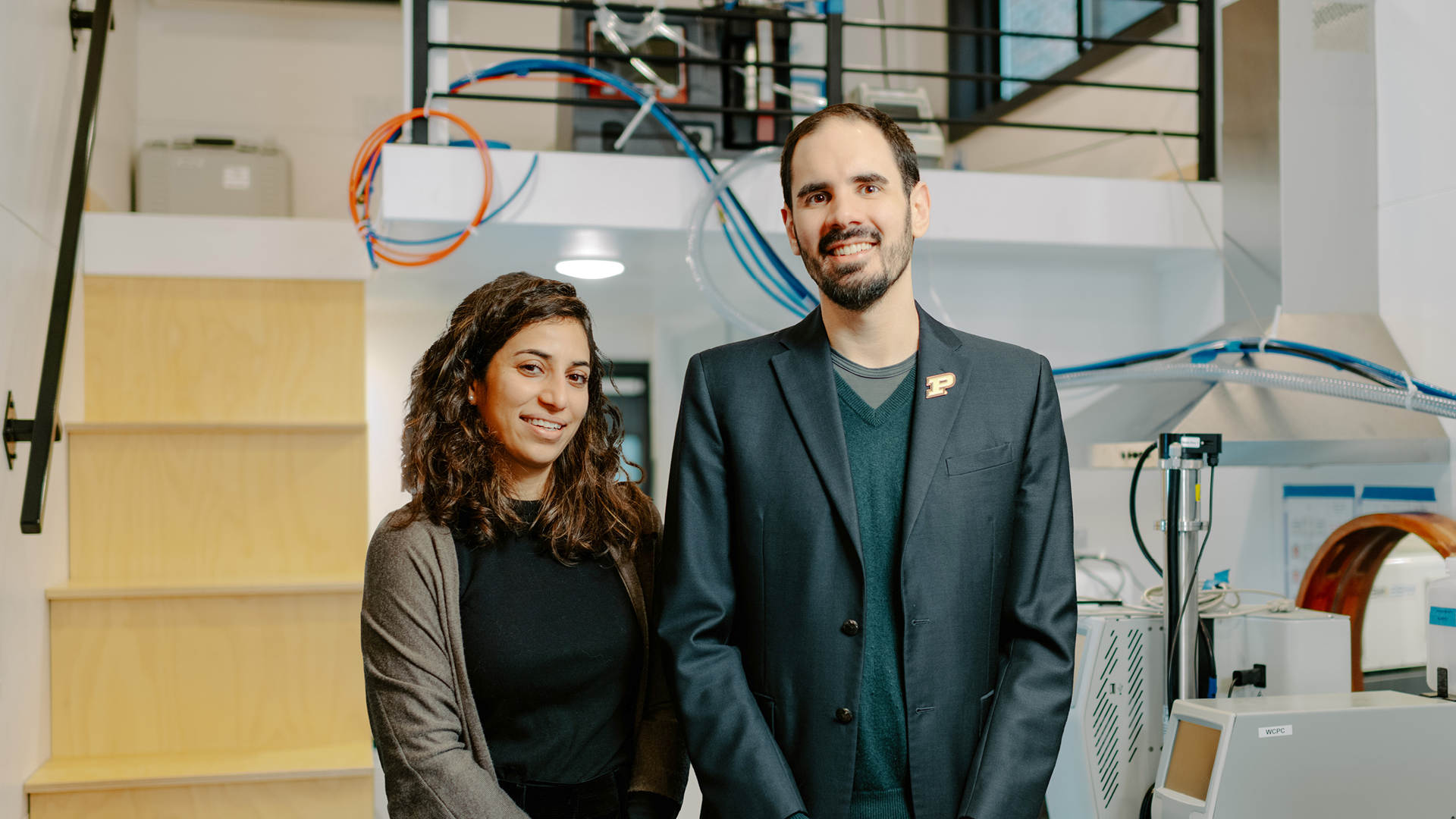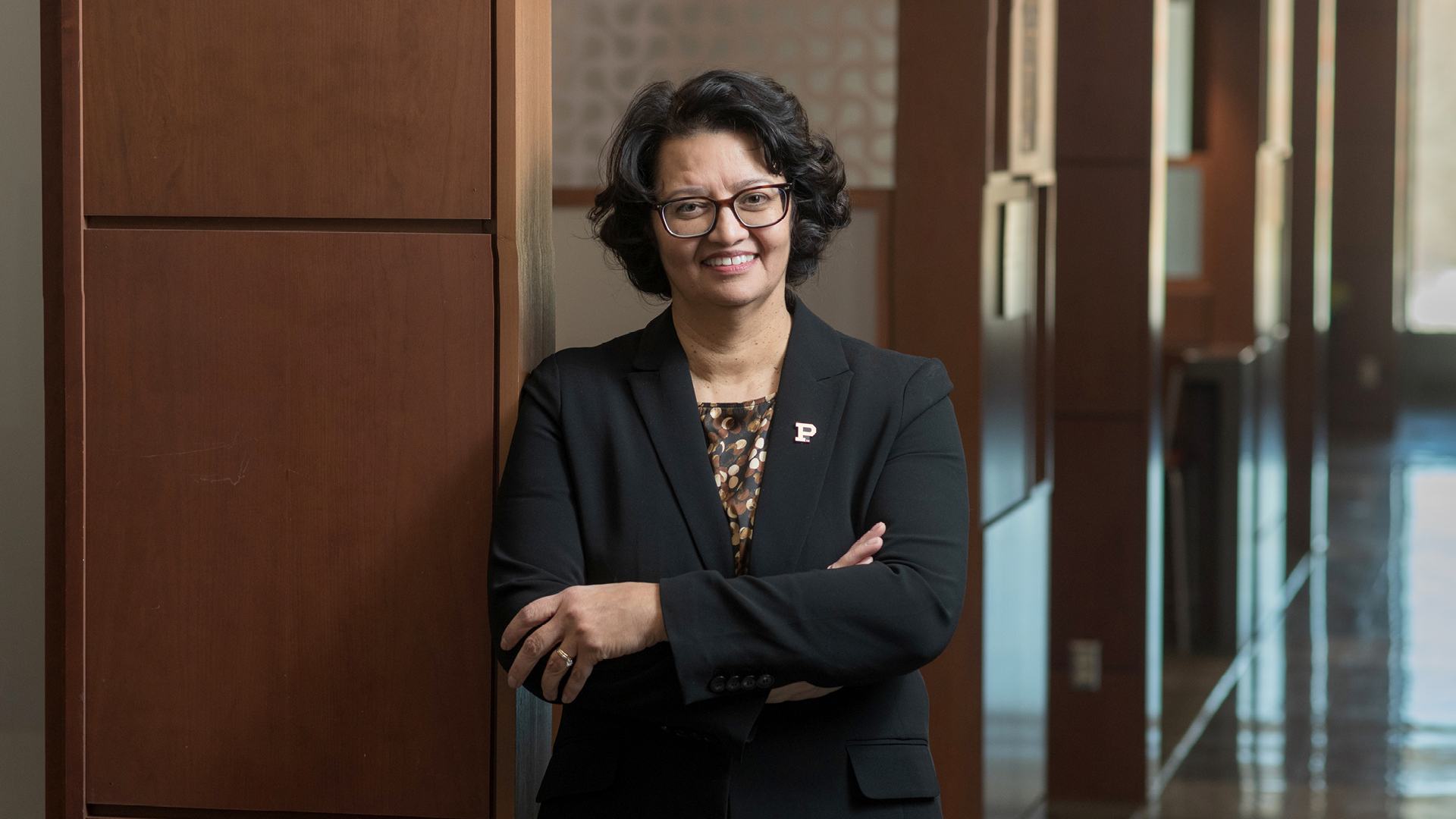Podcast Ep. 66: Entrepreneur Shawn Taylor on Embracing Change and Developing Authentic Relationships
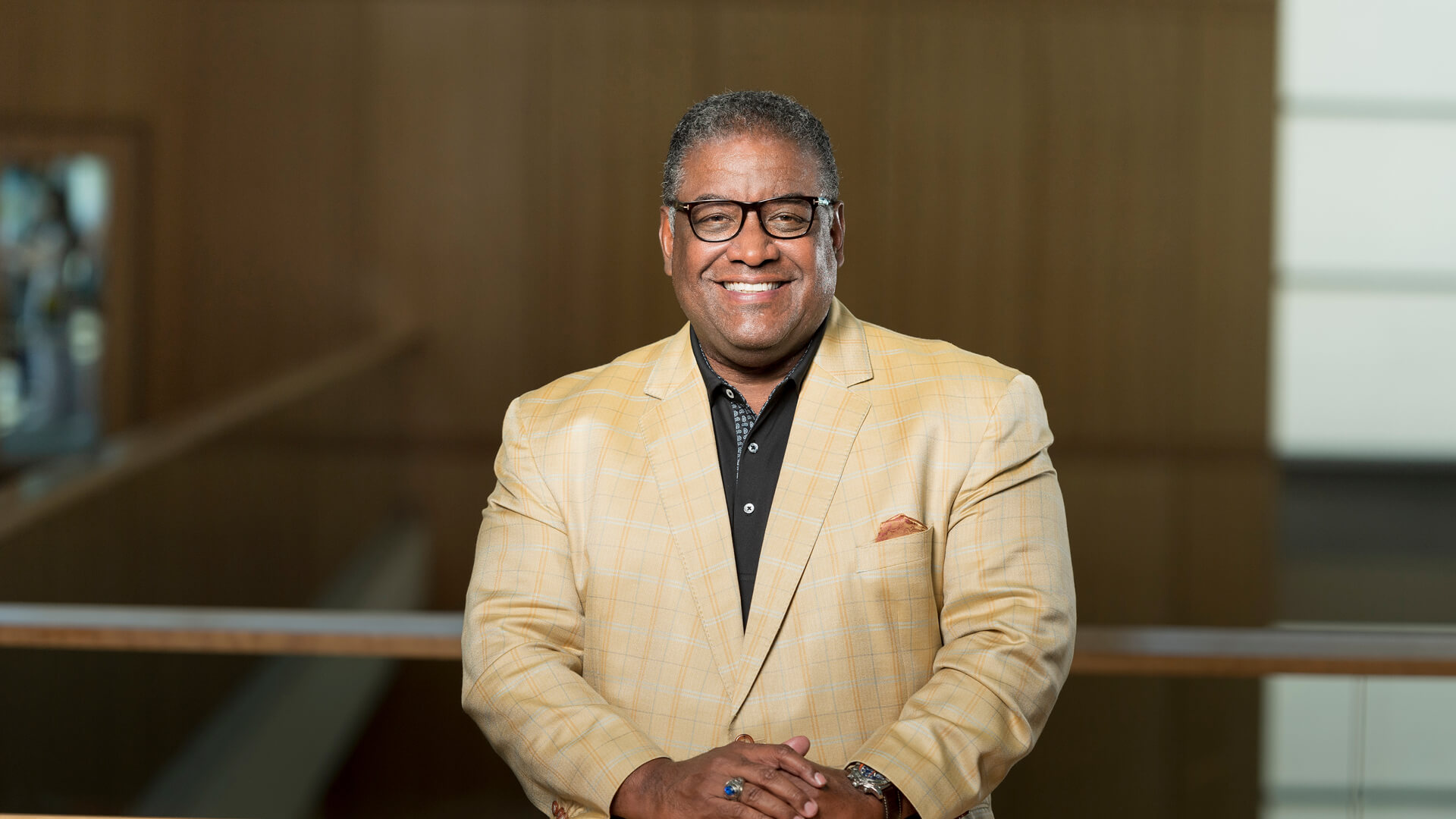
In this episode of “This Is Purdue,” we’re talking to Shawn Taylor (Management ’82), a successful entrepreneur and the newest member of the Purdue University Board of Trustees.
Listen as Shawn describes his childhood growing up on the south side of Chicago, his experience as a first-generation college graduate and the impact Purdue’s very own Dr. Cornell A. Bell, the former director/chairman of the Business Opportunity Program, had on his life both pre- and post-college.
Plus, you’ll hear about Shawn’s next giant leap as a Purdue trustee and his advice for developing relationships with people who are authentic, real and honest – and why it’s key for your career.
This emotional and motivating episode showcases true Boilermaker persistence and spirit!
- Learn more about Shawn Taylor.
- Learn more about the Purdue University Board of Trustees.
- Learn more about the Dr. Cornell A. Bell Business Opportunity Program.
- Learn more about Dr. Cornell A. Bell.
Full Podcast Episode Transcript
Kate: Hi, I’m Kate Young and you are listening to, This Is Purdue, the official podcast for Purdue University. As a Purdue alum and Indiana native. I know firsthand about the family of students and professors who are in it together. Persistently pursuing and relentlessly rethinking, who are the next game
Changers, difference makers, ceiling breakers, innovators, who are these Boilermakers? Join me as we feature students. faculty and alumni taking small steps toward their giant leaps and inspiring others to do the same.
Shawn: That’s my next big aha is being a trustee and being entrusted with one of the keys to the future of this historic place.
Kate: In this episode of This Is Purdue, we’re talking to a very special Boilermaker whose vulnerability, resiliency and kind and genuine spirit is sure to make your day. Shawn Taylor is a Krannert School of Management alumni, successful entrepreneur, and Purdue’s newest Board of Trustees member. You’ll hear Shawn, describe his childhood growing up on the south side of Chicago, his experience as a first-generation college graduate and the impact produced very own Dr. Cornell A. Bell, the first director and chairman of the Business Opportunity Program had on Shawn’s life, both pre and post college. This emotional and motivating episode showcases true Boilermaker, persistence and spirit will kick it off with Shawn taking us back to November of 1970. When he first heard about Purdue University and first met Dr. Bell.
Shawn: I was a football player in high school and we were in the playoffs. It was a Monday and it was a parent teacher kind of half day. My mother and my best friend slash teammate’s mother came up and Dr. Bell was on campus visiting with just so happy. He got assigned to our high school counselor, miss Dolores Dey, uh, who I’m still in touch.
And Ms. Dey told Dr. Bell about Tony and myself. And when she was escorting him out of the building, our mothers were in the hallway talking. And so she introduced Dr. Bell to our mothers, unbeknownst to either one of us at the time he had scheduled to come out Sunday or that week to talk to both of us when we live in different parts of town.
Unfortunately that Saturday, I didn’t know it Monday, but that Saturday wound up being into my high school career Because we lost the game. So Sunday I wasn’t in a very good mood. We lived in raw apartments as opposed to the, you know, the high rises that you typically see in major cities. And I was sitting in my mother’s bedroom, looking out the window, replaying almost every play in my head and you know, what did I do wrong?
What could I have done better? Of course I did everything perfect. But you. But I just, I really was in a foul move, waiting for Dr. Bell to come. I didn’t even know his name. And Dr. Bell pulls up in a Cadillac. It was a burgundy sedan, Deville four door with a white vinyl top. And I raise up and I look out the window and I’m like, who is this?
And he gets out of the car and I’ve told this story a thousand times. And he is got on a fedora hat, which I didn’t know. That’s what they were. A London fog, trench coat, and a three piece suit. And my comment was to myself, who is this brother? You know, it’s like Superman, right? And I yelled downstairs, ma he’s here.
And she said, well, come down and let him in. And I go downstairs and I let him in the house. He introduces himself and, and I had a big throw then. And. I was a lot smaller, but muscular, I didn’t crack a smile. I was Joe cool. And he comes in the house and we had very little furniture in our apartment and my mom was cooking Sunday dinner.
She, she was world known for fried chickens. The first comment Dr. Bell may was about, can I have some chicken? She goes, what’s not ready yet. And we sit around the kitchen table. It was like being recruited for football. And for three hours, he dies with me. Sorry. This always happens. When I tell the story, he talked about Sonya Winsley, Cynthia Barnes and.
Role parish and other students who had, um, started on BOP years before me and I was just in amazement, but I was too cool. I wasn’t showing anything. And he started talking about the money that they were making, going to work for companies I’d never heard of. I still had some hope that I would get a scholarship to major University at the time.
It was potentially between the University of Iowa and Western. Unfortunately, both of those fell through. And I remember calling Dr. Bell in December and saying, what do I need to do to be on your program? And he told me, get my transcripts. And he had this little trifold brochure that I’m sure your photographer took all the pictures for back then.
And it was that simple filling out this little application, which was just a personal data and I mailed it to them and the school sent my transcripts. I don’t know, a month or so later he called me and told me that I got accepted and, uh, would be on this program that summer. And that was the first time I heard of Dr.
Bell little. Did I know that the program that is now named, he would change my life in my life of my family for generations to come and
Kate: all, because your mom ran into the high school guidance counselor in the hallway at your high school…
Shawn: Even more random than that, that he was assigned to my high school counselor could have been any other counselor who I may or may not have had a relationship with.
I surely wasn’t the smartest student at Chicago vocational high school, but given my status as a really good athlete and I was on a national honor society. So I was a decent student. It made a difference. And so Tony and I, we were roommates on BOP and roommates for two years here at, at Purdue. He even went as far as the twist Mar to major in accounting, which I was terrified of.
And I remember sitting in his office downstairs in CRA. I mean, he was relentless. I said, well, tell you what doc, bill, I’ll cut you a deal. This was the spring of my freshman year. I said, if I get good grade in management, 200 and my out was, and I liked it. I’d study at county and he goes, well, what’s a good grade.
I said a B or better. He said, you have a deal. I fell in love with it. And the rest was history. I graduated in four years. With distinction and top 10% of my class, I had 11 job offers coming out of school and ended up going to work for Arthur Anderson in Dallas. And I’ve been in Texas ever since June of 1982. I reside in Houston now.
Kate: So as you can hear, Shawn continues to hold so much love and admiration for Dr. Bell and has so much pride in his Purdue journey. I asked Shawn, what his mom thought about his opportunity to attend Purdue as a first-generation college student. And he opens up a bit more about his childhood and his strong relationship with his mom.
Shawn: I grew up in a project on the south side of Chicago. I’m the youngest of four, uh, single mom. I was the first one to go to college. My two brothers decided to go into the military, you know, one during Vietnam, the other after, but he, the second one made a career out of it. And so he wound up going to college later in life while he was in the air force.
And then my sister, uh, who’s 12 years older than me. It started working for the Chicago police department, right out of high school, a data process in which, as she stayed with her, who knows where she had gone with technology, but she decided to go to nursing school years later and became a registered nurse.
And then my oldest brother just, he went, stopped and went, never finished. So I was the first one to go first one to graduate. So I didn’t know what I didn’t know. And my mother didn’t know what she didn’t know, but her famous thing was to all of. My job is to get you through high school and I’m done. And so when I came to Purdue, I was in culture shock.
First of all. And then I was in complete fear because studying for college was so much more demanding than studying for high school. And so fear motivated me. And so I’m like, no, you can’t give up. I need you for another four years and became a running joke for. She became enamored by Dr. Bell because he took good care of me.
What I didn’t know until January of 2012, that Dr. Bell, Dr. Siskin, who was my biology professor, who’s still alive. And my mom were in cahoots. I wound up walking on to the football team in the spring of 79. My mother was worried about me playing college football. She thought it would interfere with my studies, which I know Dr.
Bell planted that speed. And so the three of them triangulated on me to convince me to stop playing football. I did not learn that until I called Dr. Chikin and let him know that my mother had passed. And he said, I’m going to tell you something that your mom swore me the secrecy back in 1979, then that was, and he was the one that convinced me to stop playing football in February of 1979.
So she eventually acquired a, an appreciation for what this place could do for me. If I took advantage of it, if I clearly did
Kate: In this episode, you’ll hear Shawn reference ‘BOP’ a lot. The Business Opportunity Program or BOP was founded in April, 1968 to broaden student access to a world class management education.
The program was one of the first and most successful of its kind at a major business school. Then-Dean John Day hired Dr. Bell to run the program during his second year under Dr. Bell’s leadership. BOP has grown into a nationally recognized program that recruits and roles educates and provides support for both undergraduate and graduate students, pursuing management careers.
Over the years, BOP has provided opportunities for more than 1400 undergraduate and graduate students. Shawn explains more about. And what this program meant to him and how Dr. Bell’s leadership within this program impacted Shawn’s life again and again. And.
Shawn: It is unbelievable how it was conceived and carried the term after Martin Luther king was assassinated in 1968.
The Dean, I believe was four other professors here at Krannert, which honestly were all white, came together and said, we’ve got to do something to help get more black students into the business. So that was the creation of a Business Opportunity Program. I did have an appreciation back then at the demands on an administrator of a school to hire in Dr. Bell out of the Gary. Dr. Bell came down here and his first class, I think was 1971, which Roland parish was on who the CRA library is named after Dr. Bell took it from there and turned it into something unique and extra special.
It’s over 50 years old now. You know, some of my lifelong friends were people that I met in my class. In fact, my closest friend was in my class and some of the other classes before me and after me have become extremely close individuals in my life. At this point at 62 years of age, it’s an amazing program.
You start in the summer. So I graduated on a Monday. I was on campus Friday and in class on Monday. So I had less than a week of summer vacation and we took 12 hours and the goal was to help us adapt. To campus life, which it clearly did not do that. And I didn’t realize that till we came in, in the fall when regular school was in, but it gave us a base of support of people who look like me, which even to today there aren’t a lot of people who look like me on campus.
And so it became a community, uh, community of the 78 class and the three classes before me, like big brothers and big sisters. We helped each other with studying. So my biggest obstacle coming in as a freshman was my study habits. I rode three buses in each direction to get to high school city buses, not school buses.
So I’m up at six and I’m out of the house by 6 35. I’m on the bus at 6 45. And I’m in school, depending upon the weather’s 7 37 45. And if football practice I’m leaving school at six 30. So if I didn’t do my studying on the buses, and then if I got to school early, finish it up, it didn’t get done. Because I was in bed by nine o’clock every night.
I thought that was pretty good study habits, Because it worked in high school. It surely didn’t work here. It’s totally different, totally different. I failed my first math exam on B and I had a D on my psychology test and I started thinking army air force, Navy Marines. And then my friends kinda say, Hey man, look, we’re going to help you with this.
And I caught on and it took me probably a year before I figured out what I needed to do to be successful. From a studying standpoint. And that ultimately led me to Potter library where I spent the next three years in the mezzanine level or the basement level, basically doing all my study. And I never studied in the dorms, too many distractions, too much noise.
And in Potter, there were no windows on the lower level. So I had no perception of time. You know, I’d get in there. It’s daylighting and start getting high, man. It’s getting dark. I’ve been here too long. I’d leave. There were times I’d come up and I go, cause I didn’t wear a watch. I’d come up and go, wow, it’s 10 o’clock.
And I’m walking back to the dorm, 10 30, 11 o’clock at night. That became my pattern, which contributed to my success. As a student,
Kate: I can tell Dr. Bell meant a lot to you.
Shawn: He was like a dad to me. I was honored. Upon his death. And I, I didn’t know any of this. I was, I think there were five or six of us who Dr.
Bell specifically wanted to speak at his service. And I was one of them. And I almost couldn’t do it. Dr. Bell was the closest person to me in my life. That was like family to me that had passed at that time. I walked into the church and I literally locked up and it took a very dear sister of mine, Cassandra AK, who was.
First and only black homecoming queen back in the day, who’s like a big sister to me to kind of get me out of that by telling jokes. And she spoke before me and I loosened up and tried to follow her act. So that was a huge honor for me to be able to. Share with the audience, the impact that he had on my life and lives of so many other people,
Kate: he really impacted your path between Purdue and after Purdue…
Shawn: Right. Changed the trajectory he did. He taught me about the possibilities and he was real smart about how he did it. He would do by asking questions. Dr. Bell never told me what to do. He would question my decisions or he would ask me questions that I did not have answers to, but it made me think it made me wonder.
And I still use that same process today when I’m talking with students.
Kate: For Shawn, he can’t reflect on just one memory or story about Dr. Bell that stands out to him because there are way too many moments with his beloved mentor to just name one.
Shawn: I wish I could tell you this one story. My history with Dr.
Bell is so rich from literally hours that I would sit in his office and just talk to him. And it wasn’t one. There were times when Dr. Bell would confide in me when Dr. Bell would talk about how much he missed his mother, Because he didn’t have her for a very long time. When he and his wife Mildred lost their child and could not conceive, it was a car accident.
And couldn’t conceive after that, you know, she was a principal and administrator in Gary and so their students became their kids. That was Dr. Bell’s passion. To you know, me talking to him about, well, you know, I’m going to go to Dallas.
He really wanted me to stay in Chicago, close to the school Because he thought I would lose a connection, which. That was not going to happen. Right. You know, to his infectious laugh, the photographer earlier, I was doing it for him. And, and if you do it with a BOP student, all of a sudden laughter would’ve erupted.
And you know, when he would point his finger, you know, you and I would do like this and Dr. Bell had large hands, you know, but Dr. Bell would use the birdie finger when he pointed, which I won’t do on camera you know? So that became a running joke with the student. Him coming over to the dorms to have dinner with us, which was such an honor.
And it was so much fun Because he would sit around for a couple of hours and I mean, we weren’t talk in school or grace, whatever the topic was, he was engaged and he was funny and he was charming. You know, there were times where Dr. Bell would give us a ride home. If we lived in Gary or Chicago, You know, just that gracious and that helpful.
You know, I honestly don’t have one specific memory that I could say was better than other, you know, I do have memories of, you know, probably the last days of his life, which I cherish, but were also very difficult for me. Not in a sense that he’s close to the end of his time, but realizing that he needed a lot of.
Physically. And I went through that with my mom about the same time, and that was emotionally really difficult for me to see this giant. I mean, you couldn’t keep up with him when he was walking and I was in really good shape back then, you know, he, I mean, flew all over the place in his three piece suits all the time and never out of a place.
And to see him in his final days, barely able to take care of himself was really D. So kind of gone from cradle to grave in terms of memories with him. And, and I spoke with him the day that he passed. We knew that that would probably be his final day on miss earth. So they were all wonderful. And I’ll be eternally grateful for him and Dean day for giving him the chance to fulfill his greatness on this planet.
Don’t see, this is Barbara Walter’s moment.
Kate: I promise it was a two way street in this interview. When I saw Shawn getting emotional about his Purdue journey and Dr. Bell, I felt the emotions too. So when it came to Shawn’s Purdue education, he says his experiences with Dr. Bell and BOP helps him fall in love with his studies within CRA he explains more.
Shawn: I’m sort of a visual guy, you know, mathematics is not my strong suit, but this was arithmetic, adding subtraction, multiplication, and division. And what I learned real quickly is if I can understand the principles of accounting and I did the homework. I got to a result and that felt good. And I fell in love.
It was sort of like an addiction for me to get to the result. And it wasn’t that difficult for me because I put the time in to study in and memorized and, and things like that. And one thing that was also helpful for me at Purdue is I took advantage of the TA. And the professors. So I spent a lot of time, especially first two years here taking advantage of office hours.
And the other thing that was extremely helpful in my success was I had BOP students, sophomore, junior, senior levels ahead of me. And we always shared information. And so I would go talk to them about classes and which classes to put together, you know, my scheduled mix.
And that was extremely helpful in helping me manage my, my school load for studying and testing. Right. Not having multiple testing one day or five testing, one. Which is extremely stressful. So all of that was a direct benefit of being a box student. We call ourselves Boppers.
Kate: Shawn continues to stay involved with Purdue and the CRA school of management.
He’s spoken out Purdue’s commencement ceremony and he was awarded the Burton D Morgan entrepreneurship award in 2012 and the cran business leadership award in 2018. I asked Shawn, why it’s important to him to remain committed to this Boilermaker community
Shawn: in partisan obligation. I’m obligated to do it because somebody did it for me. I know the impact it had on my life. I know how it changed me as a person and I would not have made a lot of the decisions that I’ve made that have benefited me as a student and as a profess. Had it not been for Dr. Bell, the people that he recruited to this program. And in addition to that, the people who he invited back as professionals to talk to his students and talk about careers.
That’s the add on piece of why I went into accounting and went to work for an accounting firm. He had a master student didn’t go here, undergrad who went to work for one of the big eight accounting firms back in the day who came in to talk about what he did. And I was sitting in the second row from the front and I was mesmerized.
He made it fun. He was funny cracked jokes. And I remember he just went through. The progression of this level, this is how much you make. This is what you do. You get promoted the next year. That was the first thing that got me to get promoted after one year. And you get promoted after two years and blah, blah, blah.
You get up to this level as a partner you’re making, which I thought was all the money in the world. Little did I know.
And I literally sat in the classroom. I said, that’s what I want to do. And had it not been for him, I, would’ve never known about a world of public accounting. At some point I realized I didn’t want to be an. And I didn’t want to be in a big corporation because I color outside the lines.
And again, I learned that being here as a student, and I learned that being a bopper, if you will. And that ultimately led me into going into business for myself back in 1996.
Kate: As Shawn just alluded to, he left the big five public accounting world and kicks off his entrepreneurial career in the restaurant and food industry as an owner developer and operator of more than 30 restaurants in the Taco Bell franchise systems.
Shawn discusses his career path over the years and his leap of faith leaving the corporate world and going into entrepreneurship. What was that jump to entrepreneurship? Like were you scared to get out of corporate life and kind of start something new?
Shawn: No, I wasn’t scared to get out of corporate life. I was actually thrilled as an African American as a black man.
I got tired of running into brick walls and I knew I was better than what I was experiencing. And again, an upper class box student, Calvin Pennington, who. Kind of went through the same process in investment banking, which I had never heard of. We were riding down, I met him and she lives in Chicago. We decided to ride down together.
I was living in Dallas at the time and we’re riding down in his car. And I remember asking, I said, Calvin, what made you decide to leave this big company he worked for just starting your own private equity. I’ve stolen his statement. So I probably should patent it and whatever copyright, he said, I was convinced that the marketplace valued me more than the company that he worked for.
And I’ve used that a thousand times explaining. Why it was easy for me to make that I was willing to bet on me. Well, I’ll just say I spent 15 years working for two different big companies. Uh, one is a household name even today, American express and the other one’s Arthur Anderson. Who’s no longer in existence because of what happened within Ron.
So I left there and became a Taco Bell franchise. The one thing that I knew from working in the accounting profession and doing audit and consulting services was I didn’t want another job. So in other words, I didn’t wanna start with one restaurant and be the general manager and working crazy hours and dealing with teenagers and customers.
That’s not what I wanted to do. I already had a good paying. But I wanted to be in a position where ultimately I could create wealth. I’ve never had a desire to be rich, wanted to be wealthy. My definition is I work because I want to not because I have to, that’s my definition of wealthy. So I wanted to create scale and focus on what I’m really good at is infrastructure.
And so my first Taco Bell was 19 re. I had never bought a company or tried to become a franchisee, but who cares? Right. I was actually trying to buy 52 restaurants initially all at once in three different cities and that didn’t come to fruition. So my first acquisition was 19 restaurants in, um, December of 1990.
And interestingly enough, I closed on December 20th and I had to unexpectedly the day before we were scheduled to close, which was at Friday or the 20th, I got called by the bank and I needed to fly up to white Plains, New York because the documents were lost by FedEx, Because there’s a big blizzard in New York at the time.
And the only way we were going to get all the documents executed, Because there were some other documents that needed to be done was me flying up to New York. So I dropped everything I was doing Saturday trying to get my office set up. I land in Newark at one 30 in the morning and that was the last flight. I didn’t get to my hotel till three in the morning Because the driver was lost.
We wound up getting all the documents done. I fly back Friday night. Then I get home about 11. The next day, Saturday 21st was my. and I wake up 10, 11 o’clock, which I never sleep that late unless I’m sick or something like that. And I wake up by 10, 11 o’clock I’m like, oh, it’s my birthday. Oh, I got to go to work.
I was like, oh, I got to go to work. I got a company now that started, I had two partners at the time. Initially, 18 months later, I bought another 12 restaurant. Ultimately I closed some low performing restaurants or no performing restaurants built some more restaurants. My goal was to eventually be a 50 60 unit operator and an opportunity presented itself.
In 2006, I was at a restaurant conference, my spare details, but the long short story is. I went from refinancing my refinance, your house, because I was ready to start doubling the size of my company. And, uh, I need to think about selling all because of this conference I went to now, I had the consultant, I was using send me evaluation of the company.
You know, how much was it worth if I sold it? And we had a call two days later and I told the two of them that the two owners, I said, look, I, I just have one question. How real is the net number after all expenses and what I’d have to pay Taco Bell and all that and paying off my debt, he goes, well, if we can’t get you significantly more money than that, Because it’s really conservative.
We won’t charge you a. And my fee was seven figures and I literally were on speakerphone at home. I literally went tag it up, boys. I’m out of here. and it took several months to just position myself to be able to start marketing it. And then that next year I sold in June of 2007 at the age of 46.
Kate: Shawn values serving his Houston, Texas community and has served on numerous boards, including the fast casual restaurant noodles and company, Shawn dives, into more of what he’s doing currently in the nonprofit space and his recent appointment on the Purdue Board of Trustees
Shawn: I have moved from being successful to man significant.
Success is all about the individual. It was all about me in accumulation. Significance is about what will be my legacy in life. So I’ve been involved in nonprofit boards since shortly after Purdue. My first board, when I was with Arthur, Ranon the partner I worked for, asked me if I would consider joining the board of the Dallas halfway.
Which was for transition for ex-offenders. And that’s where I got my first bite of the apple, which, and I loved doing it. And then it went on to other things, probably the highlight while I was living in Dallas was the completion of a multimillion dollar building for the African American museum Dallas.
I was the youngest board member because of some of the stuff that I’ve done and sort of my thinking, I was put on the executive committee really quick, which was really cool. And so it became more of a passion for me. And I moved to Houston, um, large Taco Bell franchisee, the national charity for Taco Bell.
I don’t know if it still is. It probably is, was the boys and girls club. So I was asked to join the board in Houston. I did that for a number of years, Y M C a and some other. Nonprofit organizations. And then I decided to go back to work in 2013, become a franchisee of another concept. And I did that for a few years and sold that a couple years ago.
That one didn’t work out too good, but I learned a lot. And so I decided at some point I can’t kind of do the quilt approach. With time allocation, Because I was getting all kind of nonprofits calling me and I said, what are the most important things for me? It’s education for minority students and healthcare for poor people.
Why? Because I know you’re going to ask me that education may the life that I live today possible. Healthcare because where I grew up in the projects we’d have to get on public transportation ride for an hour to go get basic clinic services until Dr. Gloria Jackson convinced the housing authority to give her a rural apartment to set up a medical office, which.
Every day, Monday through Friday was packed from eight in the morning, till three in the afternoon. And that was all these decades later, a perfect model of how to serve poor neighborhoods. And so I got invited to join the board of Memorial healthcare system, the largest healthcare system in Houston. We do over $6 billion in revenue.
And so I’ve started having conversations with the board chair and the CEO and some of the other executives about how can we get healthcare to support people. And it has two benefits, one for the, the healthcare system and one for the community and one for community it’s pretty obvious for the healthcare system.
I wanna say about a hundred million a year is in Ingen care in our budget. And a lot of that is through the emergency room. We’ve done studies where 50% of, at one of our hospitals in the city, over the course of a year, 50% of all the emergency room visits were primary care physician related ear ache.
You know, things like. It’s frustrating for the patient, Because I’ve been there as a kid. And it’s frustrating for the medical staff who are dealing with people who are dying, who have major, major, major injuries, car accident, or a gunshot wound. And it’s a lot of friction between the patient and the caregiver.
Our staff deserves to not have to, you know, manage that and the patient deserves. To get the treatment that they deserves, and that is not the count of vehicle that we need to have in place. So that’s what I’m working on. On the education side, uh, to speak to Purdue, there have been very few years that I’ve not come back to campus, whether it was through my former employers, but for the most part, it’s been out of my pocket, uh, to come and speak to Dr.
Bell’s class while he was here. And now that Darren is running it. I’ve been on the Dean’s advisory council for the number of years, and then much of my surprise. I received an appointment to the Board of Trustees, which was pretty intimidating, to be honest. why it’s an awesome, awesome. I mean like awesome.
Like, wow, awesome. By the magnitude responsibility, this is a big business. It is huge and it’s very complex. It has a lot of moving pieces. It’s like trying to steer multiple aircraft carriers. At the same time, I spent the last 48 hours and more meetings in terms of meeting department heads than I probably would in my business career.
Probably wouldn’t have that many meetings in a year. and I was a little. How am I going to get through today? It has been so easy. I’ve been so impressed. It’s been invigorating and exciting to hear all the things that are happening here and the plans for the future. And so, uh, when, uh, the chairman of the board, Mike called me and told me on a Thursday, I was looking at a picture of me and Dr.
Bell that we took in his office down hall many years ago. And he goes, what do you. I said, well, Mike, I’m pretty full right now. And I said, I’m looking at this picture with Dr. Be. And my first thought is, I wish he could be here for 10 minutes just to see this. And secondly, my life has now gone full circle with Purdue University.
So I’m honored. I am now really excited to get to work. It’s going to take some time to get up the learning curve. But my, my, my goal, I was asked about president elect kind of what my goals are. And I said, well, I can’t tell you right now, but my focus is to figure out what lane or lanes that I can run in that I can have a legacy effect on the future of the University.
Kate: So, Shawn has a lot of community philanthropy and nonprofit experience under his belt. And as Shawn just mentioned, he is the newest member of the Purdue Board of Trustees after being appointed on July 1st, 2022, as for Shawn’s next giant leap. Well, that answer was pretty clear.
Shawn: Being a trustee
Kate: I figured that was the answer being a trustee.
Shawn: It really is. You know, I’m looking at some business ventures right now. I’ve been there. I’ve done that. You know, my role is more trying to help the entrepreneur navigate through all the traps and opportunities in a shorter length of time, because I’ve done a lot of that. But being a trustee of a prestigious University, like Purdue is a whole other level.
And fortunately I’ll get to tap into everything my whole life experience, not just the business or the school part, but the things that have made me be who I am know the experiences that I’ve had on this campus as a student, which were both good and bad. You know, to be honest with you, to the things that I’ve done on other boards that I can bring to add value here.
And then my work ethic, I was telling a fellow trustee earlier today, I knew it was going to be a lot of work. I didn’t know it was going to be two times the amount of . So that’s that’s my next big aha is being a trustee and, and being entrusted, you know, with one of the keys to the future of this historic.
Kate: And what does this Purdue community and Boilermaker spirit mean to Shawn at this point as a trustee?
Shawn: You know, I can’t answer that question. I don’t use the word can’t or cannot very often. My emotions right now are so high. I’m not drinking from the fire hose. I’m not drinking from the Hy. I’m actually tapped into the water main right now. And it is coming at me so fast and at such volumes. I’m going to have to take a few, Because I got board meeting the next week.
I’m going to have to take a few days just to hit the pause button and just start processing and start trying to figure out where I fit. What value can I add? Because it’s all about adding value, whether it’s adding on top of something or. The consultants like to use the word pivot, help us pivot what relationships can I tap into to help the University.
It’s bigger. It’s much bigger than I could have imagined. You know, I give a lot of speeches. And one of the things that I used to say is the vision that I have for myself is much smaller than the vision that God has for me. This is really tested me and it’s really stretching me. It’s stretching my imagination to the unlimited possibilities that not only this University has to offer, but what life has to offer in general.
And so I’m having to rematch it and recreate my reality.
Kate: As for Shawn’s advice to young Boilermakers, Shawn recently went golfing with Darren Henry, the managing director of the Business Opportunity Program, along with some BOP students. And he shares the guidance that he told them,
Shawn: So I’m out playing golf with, uh, three of the current students. I mean, they peppered me with questions. The whole round, we, we played eight holes and, uh, one young man was asking about, you know, what have you seen over the years that has helped students be successful? And I would say whether it’s Purdue or in life or company, you work for owning your own business, a major chunk of.
However you define it and it’s different for everybody. You have to put the work in, you have to show up every day, even when you don’t feel like it, but you really have to put the work in and not be a clock watcher and understand. And, and this is something that Dr. Bell taught me embrace change. I learned later in life that it is the most natural thing in life.
If you fight it, you’re going to. Or you going to make your life that much more difficult? So the two things that I tell people embrace it, learn how to make it work for you and start learning to be more observant. So you can anticipate the change coming your way, whether it’s good change or challenge and change, it can all be good for you.
Because a challenge and change is going to stretch you. It’s going to move you out of your comfort zone and help you be smarter and hopefully a better person. So that’s the message. I want people to hear. Work your tail off. And then probably the other thing is learn to develop authentic relationships. I used to just say, learn to develop relationships and that meant all of them.
learn to develop relationships with people who are authentic, who are real, who are honest, who have your best interest. And you may find that’s not a big pool of people, but that is okay. And be quick to quick, the fire and slow to hire. I use that at work, but even in your personal relationships, you know, if someone is a taker they’re constantly draining you, they always want something from you.
Whether it’s something tangible or emotional, those are the people you need to, you know, in a very nice way, just kind of fall out of contact with sometimes, but learn to develop authentic relationships. I am who I. Because of relationships over my lifetime, going all the way back to my mother, you know, my siblings, my football coaches, Ms.
Dey teachers, it may be something complimentary that I didn’t realize about myself that gave me that spark. It may be a hand up, not a handout. Yeah. Yeah. I worked hard, but working hard is not the equation. That’s just the piece of it. But learn to embrace people who have your best interests at. Because it’ll make all the difference in the world.
Those are the couple of things that I share with students.
Kate: Shawn also shares additional words of wisdom on dreaming big and never getting too comfortable.
Shawn: One of the consistent things that I’ve experienced with people throughout my life is that people tend to put themselves in a bottle and they limit the possibilities and they limit their potential.
I like to say it’s because they don’t dream big enough dreams. They remain comfortable not realizing that remaining comfortable, eventually is going to. We’re seeing it today in today’s economy. Right? A lot of people because of the pandemic got big raises. If you’re not only working at a big raise, right.
It’s being gobbled up now because of high fuel, just high fuel prices, alone and high food price. The things that are a staple in your life cost you 20% more today in some cases, And if you try to stay constant, you’re literally losing ground over time. I try to stress to people step out of yourself and really stretch your imagination to dream bigger dreams and bigger possibilities of what you could do with your life, whether it’s work, whether it’s community.
Or whether it’s your family think of bigger possibilities? I always say unlimited possibilities. I’ve never seen a computer and been a human being. So think about that. And it all starts with a dream or possibility and your imagination. Second one is it takes a lot of courage. To going ins. I used to say the naysayers and I was given this talk to some high school students.
And what students came up to me afterwards and said, I used to change that to haters, Mr. Taylor, you got to learn to ignore the haters. Because people will be envious and jealous and won’t want to see you succeed. And so stay true to yourself, true to your dreams and just keep on trucking. And the other one is Murphy’s law.
Whatever can go wrong will go. And so you have to be flexible. You have to be able to adapt. You have to make sacrifices. Sometimes that means less sleep. Sometimes that means, you know, I hate to say it, but there are periods of time when I was in my twenties and I was seeing, I was working ungodly hours where I throw a load of laundry in the washer.
When I got home at midnight. And I get up in the morning, I throw it in the dryer and by the time I’ve showered and shaved I’m going in the dryer, it was my dresser and I’m getting under clothes out or shirt or whatever. I was too tired to make up my bed and I’m sleeping on the mattress, Because the sheets are in the washing machine.
It’s inconvenient, it’s uncomfortable, but I was trying to stay true to my ultimate goal. So sacrifices are required. Big dreams, courage, commitment, authentic relationships.
Kate: As Shawn shared throughout our interview, he has had to display plenty of courage and commitment throughout his life. But he’s also experienced a lot of hope, but you’ve overcome a lot in life.
Yes. How do you keep going and looking towards the future and how did you overcome all of these things to be sitting here where you are right now?
Shawn: Good question. I would have to say depends on what phase of my life I was in. So I come to Purdue. I was motivated by fear. Fear of failure. I didn’t know what I didn’t know.
So I come here and I start meeting kids from walks of life that I’d never experienced, let alone seen up close and personal, and I start talking to them and I go, you live where? And your parents do what? And they make how much money and you drive a brand new TransAm with the Firebird on the hood and the tee tops.
Y’all too young to know what, let the camera man, I’m talking to . There were worlds that I didn’t know existed other than what I would see on TV. And so I knew it’s going to sound terrible. I knew I didn’t want to go back to the projects. And so whatever it took, I was going to do it. If it met, I was going to have to go to summer school.
I would go to which fortunately I didn’t have to do that. It meant I was going to study all night. I was going to study all night, but I was fearful of failing, not for the sake of failing, but because of the end result would be, I get kicked out of Purdue. I can’t get funding. And I’m back in the projects on the south side of Chicago.
And that went all the way through Purdue. In fact, I didn’t know I was going to graduate. I had two CS in four years, one in English and one at my advanced cost accounting, which, because I slacked off on my final. I went from a B to C, but until I was halfway through my first semester, senior year, I’m like, I’m going to graduate.
And then as I started working and started getting exposed to more things, I became more aspirational. So in my early to mid twenties and man, what do these people do to afford a house like that? What do these people do to fly first class? And so I started talking to people who were at those levels and were, oh, wow.
I didn’t know that you could do. Being an entrepreneur, never entered my mind, my own business until I started running a lot of people who were doing extremely well financially and they weren’t working for big companies. And so that transition for me psychologically was a lot easier. But if I could put it in and tag it with one word, it’s hope.
I’ve never lost hope. And that gets me up in the morning and it keeps me up late at night when I have things that I have to do, because I’m not focused on what I’m going through or focused on what I’m going through and how it’s going to get me to ultimately, where I want to be. As you’ve probably heard motivational.
It’s not about the destination. It’s whatever that journey is right now, it’s like flying. If I’m trying to get home and I’ve got to connect through a city, but it’s going to get me home. And that’s when I’m more focused on is getting hope is a pretty powerful word. If you’ll embrace it.
Kate: We can’t thank Shawn enough for sharing his story on This Is Purdue.
If you’d like to watch our full video interview with Shawn Head over to. youtube.com/Purdue. Trust me, you want to see Shawn’s interview to truly experience it.
Thanks for listening to this is Purdue. For more information on this episode, visit our website at Purdue.edu/podcast. There you can head over to your favorite podcast app to subscribe and leave us a review and as always boiler up!
